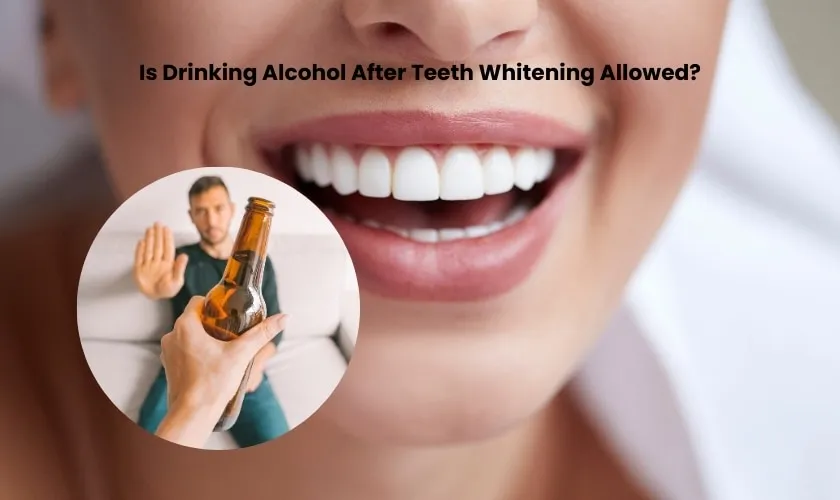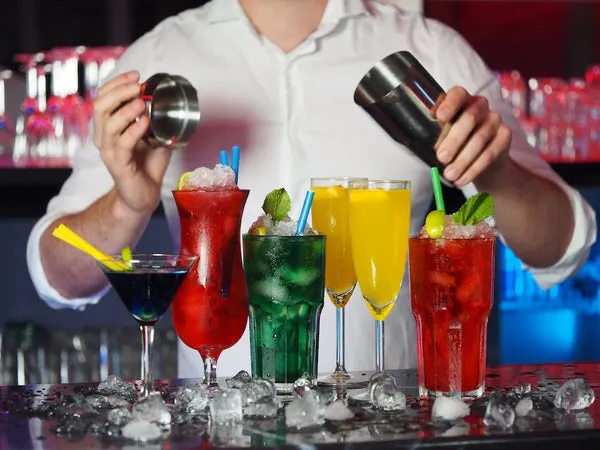Understanding Teeth Whitening and Alcohol
Teeth whitening is a popular cosmetic dental procedure, while alcohol consumption is a common social activity. However, the two don’t always mix well. Combining them too soon after a whitening treatment can negatively impact your results, leading to discoloration and a less radiant smile. This article delves into the science behind teeth whitening, the impact of alcohol on your teeth, and provides practical guidance on when it’s safe to enjoy your favorite alcoholic beverages after a whitening procedure. We’ll explore the recommended waiting periods, factors that influence these periods, and alternative choices to keep your smile bright and your teeth healthy.
The Science Behind Teeth Whitening
Teeth whitening treatments work by using bleaching agents, typically hydrogen peroxide or carbamide peroxide, to break down stains and discoloration on the enamel of your teeth. These agents penetrate the enamel, oxidizing the staining molecules and making them less visible. The process essentially reverses the staining process, restoring the natural whiteness of your teeth. The effectiveness of the treatment depends on factors like the concentration of the bleaching agent, the duration of the treatment, and the type of stains present. Professional treatments, performed by dentists, usually employ higher concentrations of whitening agents and can offer more dramatic results compared to over-the-counter products.
How Teeth Whitening Works

Teeth whitening procedures usually involve a preparatory phase, application of the whitening agent, and a post-treatment phase. Before the whitening process, your dentist may clean your teeth to remove plaque and surface stains. Then, the whitening agent is carefully applied to your teeth, often using custom-fitted trays or a professional application method. The agent is left on your teeth for a specific duration, and during this time, it penetrates the enamel to address the stains. The post-treatment phase involves rinsing your mouth and sometimes applying a fluoride treatment to help remineralize your enamel. Avoiding certain foods and drinks, including alcohol, during this phase is critical to ensure optimal outcomes and avoid potential sensitivity.
Alcohol’s Impact on Teeth
Alcohol consumption can significantly affect teeth, particularly after a whitening treatment. It’s essential to understand how alcohol interacts with your teeth and how it can affect the whitening process. Alcohol, especially dark-colored beverages like red wine, beer, and certain cocktails, contains chromogens, which are pigment-producing substances. These chromogens can easily stain the porous surface of your teeth, especially immediately after whitening when the enamel is more susceptible to absorbing colors. Furthermore, alcohol’s acidity can erode the enamel, making it more vulnerable to staining and increasing the risk of sensitivity.
Why Alcohol Stains Teeth
Alcoholic beverages contain compounds that can stain your teeth, particularly after a whitening treatment. The enamel of your teeth is porous, and whitening treatments temporarily increase the porosity, making them more susceptible to staining. Red wine, for instance, is notorious for staining teeth due to its high concentration of tannins and chromogens. Beers, especially dark ales and stouts, also contain color pigments that can lead to staining. Clear liquors, such as vodka or gin, are less likely to cause direct staining, but when mixed with dark-colored mixers like cola or fruit juices, they can still contribute to discoloration. It is advisable to minimize or avoid alcohol consumption to protect the results of your whitening procedure.
The Timing Drinking After Whitening

The timing of when you can safely drink alcohol after teeth whitening is a critical factor in maintaining your newly whitened smile. The enamel of your teeth is more porous immediately after the procedure, and therefore, more prone to staining. Understanding the recommended waiting periods and factors influencing these periods will help you make informed choices. The goal is to allow your teeth to re-mineralize and become less porous, reducing the risk of staining. By adhering to these guidelines, you can significantly enhance the longevity of your whitening results and maintain a brighter, more confident smile. Remember that patience and adherence to your dentist’s recommendations are key.
Recommended Waiting Period
The standard recommendation is to avoid alcohol for at least 48 to 72 hours after a teeth whitening procedure. This timeframe allows your teeth’s enamel to partially re-mineralize and reduce its porosity. During this period, the enamel is more susceptible to absorbing colors from food and drinks, making it easier for staining to occur. Some dentists may recommend a longer waiting period, particularly if you’ve had a more intensive whitening treatment. Always follow your dentist’s specific instructions, as they will consider the type of whitening you had and the sensitivity of your teeth. By strictly adhering to the recommended waiting period, you increase the likelihood of maintaining the brighter, whiter results achieved through your whitening procedure.
Factors Influencing the Waiting Period
Several factors can influence the recommended waiting period for alcohol consumption after teeth whitening. The type of whitening treatment plays a role; professional in-office treatments may require a longer waiting period compared to at-home kits, due to the higher concentration of bleaching agents used. Your diet also significantly impacts the waiting period, as consuming staining foods and beverages alongside alcohol can increase the risk of discoloration. The sensitivity of your teeth is another factor; if you experience heightened sensitivity after whitening, your dentist might suggest a longer period to allow your teeth to recover. Additionally, your overall oral hygiene habits, including brushing, flossing, and using mouthwash, can affect how quickly your teeth recover and how well they retain their whiteness. Therefore, it’s important to follow your dentist’s guidance based on your specific circumstances.
The Type of Whitening Treatment

The type of teeth whitening treatment you undergo influences the recommended waiting period before drinking alcohol. Professional, in-office whitening treatments usually involve higher concentrations of bleaching agents and can lead to increased tooth sensitivity. Therefore, dentists often advise a longer waiting period (72 hours or more) to allow the enamel to settle and reduce the risk of staining. At-home whitening kits, on the other hand, typically use lower concentrations of bleaching agents. The recommended waiting period might be slightly shorter, often around 48 hours. Always follow your dentist’s specific advice based on the treatment you’ve received, as they can assess the sensitivity of your teeth and provide tailored recommendations. They can also advise on any other precautions you should take.
Your Diet
Your diet plays a crucial role in maintaining your newly whitened smile. After teeth whitening, you should avoid or minimize consuming foods and drinks that can stain your teeth. These include dark-colored beverages such as red wine, coffee, tea, and colas. Similarly, you should be mindful of deeply pigmented foods like berries, soy sauce, and curries. Staining from these foods can be exacerbated by alcohol consumption, leading to a quicker discoloration of your teeth. Instead, opt for lighter-colored foods and drinks during the waiting period to help preserve your whitening results. Make sure to rinse your mouth with water after each meal, and gently brush your teeth after eating if you feel it necessary, to prevent stains from setting in.
The Aftermath Avoiding Alcohol
Understanding the potential consequences of consuming alcohol too soon after a teeth whitening treatment is essential to protect your investment in a brighter smile. Discoloration, increased sensitivity, and the possibility of needing additional treatments are all potential outcomes of not adhering to the recommended guidelines. By knowing what to expect and taking appropriate precautions, you can enjoy your social life while keeping your teeth looking their best. Remember that a little bit of patience can go a long way in preserving your whitening results. Following the advice of your dentist and making informed choices can make a significant difference in the longevity of your brighter smile and overall oral health. Prioritizing these things will help you maintain the whiteness and health of your teeth.
What to Expect After Drinking Alcohol Too Soon

Drinking alcohol too soon after teeth whitening can lead to various negative consequences. The most visible outcome is often discoloration or staining of the teeth. Alcohol, especially when combined with dark-colored mixers or consumed in drinks like red wine, can quickly stain the porous enamel. You might notice your teeth reverting to their original shade or developing uneven staining. Increased tooth sensitivity is another common problem. The whitening process can make your teeth temporarily more sensitive, and alcohol, with its acidic properties, can exacerbate this sensitivity. This could make it painful to consume hot or cold foods and beverages. Additionally, you might need to undergo additional whitening treatments to correct the damage caused by early alcohol consumption, which can add to the cost and inconvenience of the process. This can also cause your teeth to be more vulnerable to future staining.
Signs of Staining and Damage
Recognizing the signs of staining and damage is essential if you’ve consumed alcohol too soon after teeth whitening. The most immediate sign is the appearance of discoloration. You may notice uneven patches or an overall darkening of your teeth, which can appear a few hours or days after drinking alcohol. Increased sensitivity to hot or cold foods and beverages is another common symptom, as the enamel’s increased porosity makes it more susceptible to irritants. If you experience these symptoms, it’s important to contact your dentist promptly. They can assess the extent of the damage and recommend treatments, such as additional whitening sessions or specialized toothpaste to reduce sensitivity. Prompt intervention can help minimize the impact and restore your smile to its optimal whiteness.
Alternative Beverages
While it’s crucial to avoid alcohol immediately after teeth whitening, there are several alternative beverages you can enjoy. Opting for clear or lightly colored drinks can help you maintain your bright smile. Water is always the best choice for hydration, and it also helps rinse away any potential staining particles. Clear soft drinks like Sprite or 7-Up are also viable options if you want something with a bit more flavor. For those who enjoy alcoholic beverages, consider clear spirits mixed with clear mixers, but it’s still best to wait the recommended time before consuming them. Always be mindful of your overall diet and oral hygiene during the waiting period and beyond to preserve your whitening results and promote optimal oral health. These are all viable options to help you enjoy your time.
Beverages to Avoid

To protect your teeth whitening results, certain beverages should be avoided, especially during the initial waiting period. Dark-colored drinks are the primary culprits for staining. Red wine, known for its high concentration of tannins and chromogens, is a major offender. Coffee and tea, due to their dark pigmentation, should also be avoided. Colas and dark-colored fruit juices can also contribute to discoloration. It’s best to steer clear of these beverages to minimize staining. When you do choose to drink these beverages in the future, make sure you rinse your mouth with water immediately after. Avoid these drinks to protect the results of your teeth whitening.
Tips for Maintaining Results
Maintaining your teeth whitening results involves a combination of good oral hygiene practices and lifestyle choices. Regular brushing and flossing are essential for removing plaque and preventing stains. Using a whitening toothpaste can also help maintain brightness. Avoiding staining foods and beverages, as previously mentioned, is key. Regular dental check-ups and professional cleanings every six months help remove surface stains and keep your teeth looking their best. Consider touch-up whitening treatments as recommended by your dentist to maintain the results over time. With these simple steps, you can extend the life of your bright, white smile and maintain great oral health for the long term.
Oral Hygiene Routine
A consistent oral hygiene routine is vital for maintaining your teeth whitening results and overall oral health. Brush your teeth at least twice a day, for two minutes each time, using a soft-bristled toothbrush and fluoride toothpaste. Floss daily to remove food particles and plaque from between your teeth and along the gumline. Consider using an antibacterial mouthwash to further reduce bacteria and plaque buildup. Schedule regular dental check-ups and professional cleanings every six months to remove stubborn stains and tartar. These appointments also allow your dentist to monitor your oral health and provide personalized advice. By incorporating these habits into your daily life, you can keep your smile bright and healthy for years to come.
Regular Dental Check-ups

Regular dental check-ups are essential for maintaining the results of your teeth whitening treatment. During these visits, your dentist will examine your teeth for any signs of staining, decay, or other dental issues. They will also professionally clean your teeth, removing any surface stains and plaque that can dull your smile. Your dentist can also provide personalized recommendations for maintaining your oral hygiene and offer advice on touch-up whitening treatments, if needed. Regular check-ups allow for early detection and treatment of any problems, ensuring that your teeth remain healthy and your smile stays bright for the long term. Make sure you keep your scheduled appointments to ensure your teeth stay their whitest.
Conclusion
In conclusion, enjoying a brighter smile after teeth whitening requires a commitment to understanding how alcohol and other factors can impact your results. The key is to adhere to the recommended waiting period before consuming alcoholic beverages and to be mindful of your diet. By making informed choices and following your dentist’s advice, you can preserve your investment in a beautiful smile and maintain optimal oral health. Remember that patience and diligence are key to enjoying long-lasting results, and don’t hesitate to consult with your dental professional for personalized advice and guidance.
